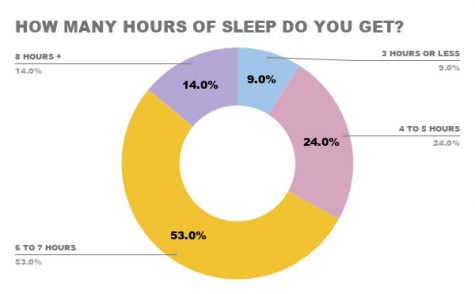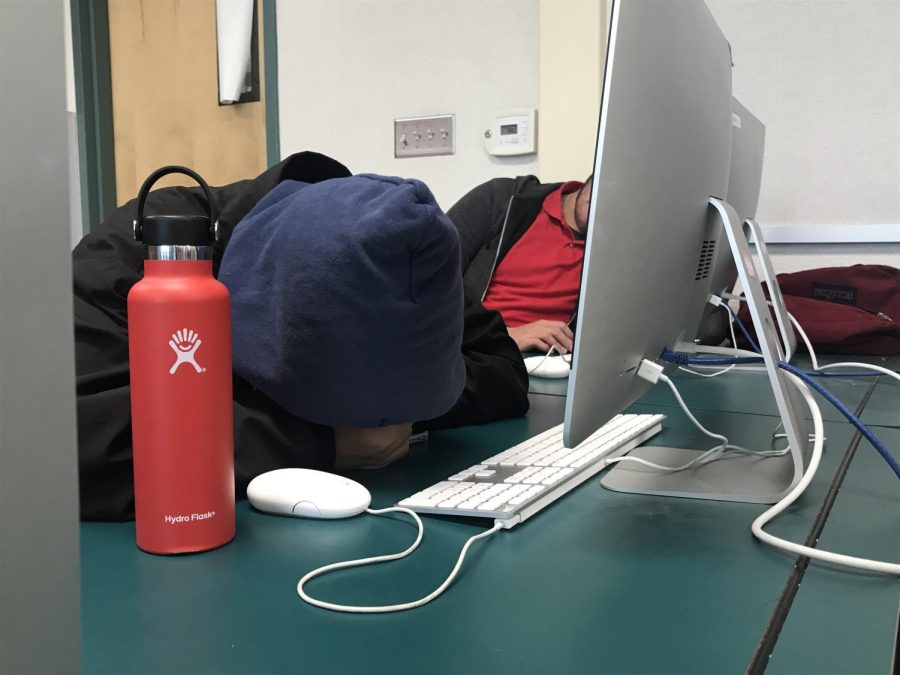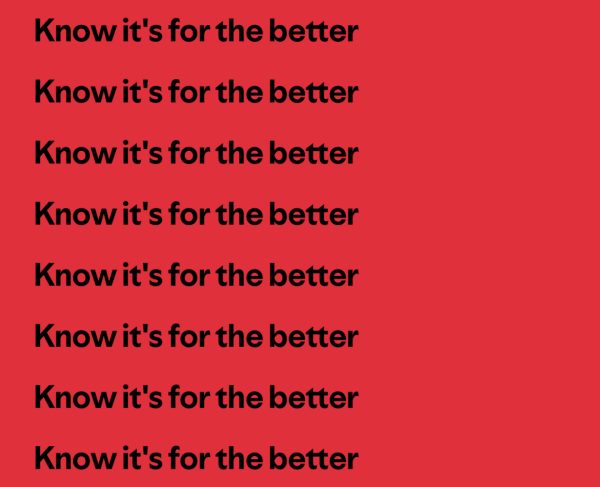Catching Z’s is harder than it seems
How much sleep do we really need?
It’s almost midnight and senior Stephanie Chung wakes up from what was supposed to be a 30-minute nap. At this rate, it is impossible to get her AP Calculus homework done. Now, it’s nearly 1 a.m. and she’s only halfway done, realizing she was sucked into the realm of social media. Finally, at 2:30 a.m. she’s finally ready to reconcile with her long-awaited bed. Fast forwarding to 7:55 a.m., as a soulless figure walks down the corridors of school, dead on the inside, with a macchiato in hand.
In a recent Clark Chronicle survey of 88 students, only about 14 percent of students at Clark get eight or more hours of sleep, leaving a majority of students getting less than the recommended hours of sleep. According to the National Sleep Foundation, teens need 8 to 10 hours of sleep, and one study suggested that only 15 percent of teens sleep within this range, results that mirror the findings of the Clark Chronicle poll.
Because of the larger numbers of sleep-deprived students, California Senate Bill 328 was put forward this year in attempt to require all California middle and high school begin no earlier than 8:30 a.m. This was first introduced by Senator Anthony Portantino in Feb. 2017, and was put through three readings in Sacramento with amendments made as of Sept. 2017. However, during the last reading, passage was refused on a 26–30 vote, meaning that the bill is dead this year. “In my opinion, school should start at a later time.” Chung said. “With the school start time now, I don’t have time to eat a proper breakfast and barely have time to get ready. If we start school later, I can do those things while waking up at a reasonable time.”

Sitting in a rigorous class while being sleep-deprived is far from ideal. Getting a good night’s sleep can impact a student’s learning greatly. When getting the right amount of sleep consistently, one’s attention is enhanced, learning is easier, problem-solving skills become better, and the ability to recall information is improved.
“I think [sleep] has a profound impact,” said English teacher Stephanie Sajjadieh. “I think that if you don’t sleep enough, you’re not processing thoughts properly. I was at a [teacher] training recently, and they said that for the average teenager, they need 10 to 11 hours of sleep because of where their brain is in terms of brain development. And I know that most students, if they get even six [hours of sleep], it’s probably a good night.”
In most cases, students stay up in order to finish their homework because of time lost due to extracurricular activities, jobs and family responsibilities. With this heavy workload, some students adapt to unorthodox sleeping schedules, such as senior Samantha Gerolaga. “I sleep at 7 or 8 in the evening, then wake up at 3 in the morning to finish my homework,” Gerolaga said. “After the past four years, my sleeping schedule has really been out of order and does affect how I feel at times. Sometimes when I’m sleep deprived, I freak out and get a lot of anxiety that lasts throughout the day.”
Although many students have so much to balance at once, time management may also be a problem. “Managing time is hard when there’s so much to do in so little time. It makes you feel like you don’t know where to start, so you just don’t,” Chung said. Because of the lack of time management, students are prone to feeling tired in class, sometimes even falling asleep. “At times I am able to tell when a student has not gotten enough sleep,” said AP Psychology teacher Patrick Davarhanian. “When anyone is deprived of an adequate amount of sleep they experience mental fatigue and it is most visible during class activities. Sleep deprived individuals will lose focus on tasks, and they do not perform well on assessments. Also, students who do not get enough sleep can be moody and unresponsive.”
However, if students learn to adapt to a schedule that allows for work to be done in a timely manner, it may allow them to attain better sleeping schedules. “I think that it’s a heavy workload, but then I also taught at a school where classes met every day, so the work that I’m assigning every other day would be the work I would assign everyday there,” Sajjadieh said. “So I don’t know if it’s as much amount of work, as it is the management of time. I don’t think students know how to manage their time well and procrastinate. If you really managed it properly, the work would not be that overwhelming. But when it’s not done in a timely way, it starts to pile up and it starts to be overwhelming, then you’re up all night or getting up at 3 in the morning and setting an alarm to try to finish it.”
Other than lacking in time management techniques, students also experience pressure not only within themselves, but from external sources such as the school and from their parents. With college just around the corner, a plethora students are expected to meet high standards and won’t stop until they do, even if it means losing sleep. “I think the pressure put in students, not only by the schools but by their families is greater, I think that the pressure they put on themselves is greater, so there’s a sense of sometimes meeting these unrealistic expectations that come from everywhere, and I don’t know that I felt that at all when I was younger,” Sajjadieh said.














